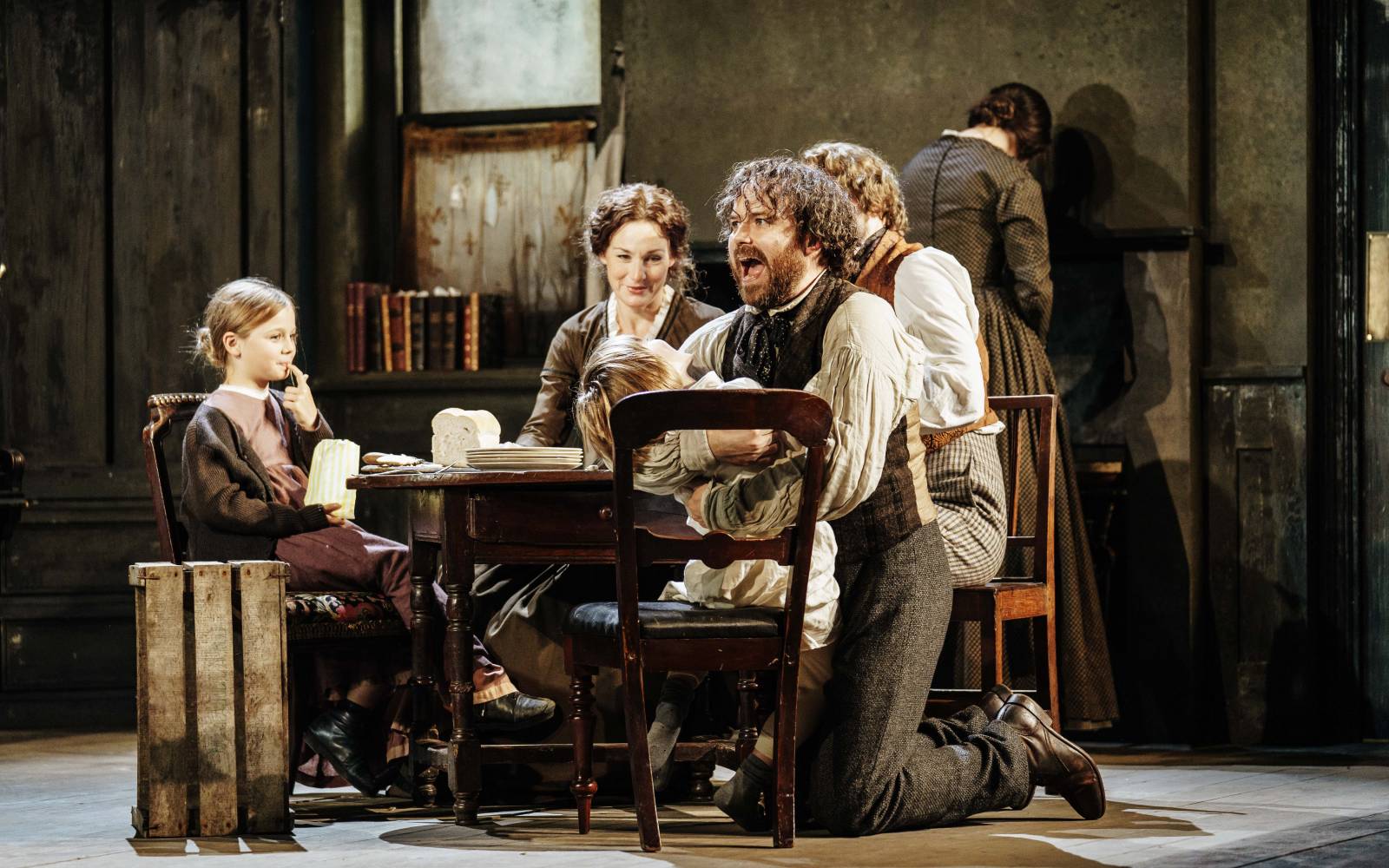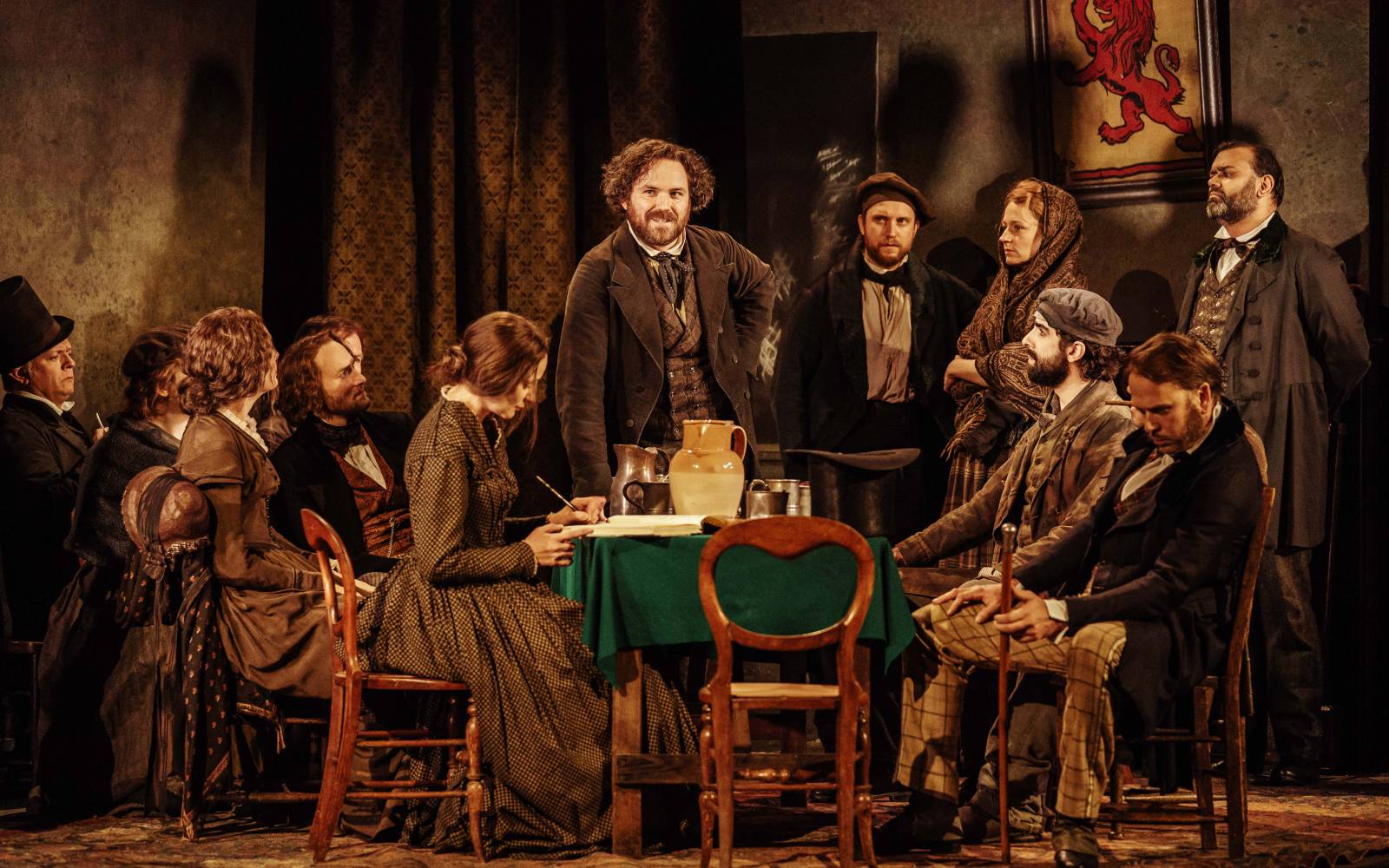
The Second Time as Farce
Francis Wheen, Marx’s biographer, describes life in the Dean Street household
It is one of Karl Marx’s most quoted lines: “Hegel remarks somewhere that all great world-historic facts and personages appear, so to speak, twice. He forgot to add: the first time as tragedy, the second time as farce.” As something of a world-historic personage himself, perhaps Marx wouldn’t be surprised to learn that even his own domestic life – so often scarred by tragedy – would one day follow his dictum by reappearing as theatrical farce.
From his headstone in Highgate cemetery to a thousand book covers and Soviet Bloc statues, the stern white-bearded prophet is such an iconic image that it’s hard to picture Marx any other way. The roguish young roué of this drama – boozing and swearing, laughing and loving, dodging and weaving – may startle some audiences. Yet here’s the most startling thing: almost all of it is true.
Take the absurd opening scene, in which the down-at-heel revolutionary offers a London pawn-shop some silver marked with the crest of the Earls of Argyll. The pawnbroker calls the police, suspecting – reasonably enough – that a German refugee can’t have acquired these heirlooms legitimately, and ridiculing Marx’s protestations that his wife is descended from Scottish Earls. Take it from me as his biographer: this actually happened. (In real life, he had to spend a night in the cells before Jenny could convince them of her aristocratic bona fides.)
The play begins in November 1850. Marx had arrived in Britain 15 months earlier, having been expelled from France (twice), Belgium and his native Prussia. His heavily pregnant wife and their three small children had joined him soon afterwards, sick and exhausted and with scarcely a penny to their name. Their fourth child entered the world on 5 November 1849, to the sound of fireworks and street parties: after the significance of the date was explained to them they christened the boy Guido, in homage to the gunpowder plotter. He was affectionately known as Fawkesy.
Marx loved nicknames. His collaborator Frederick Engels, who fancied himself as a military strategist, was addressed by his imaginary rank, ‘General’. Helene Demuth, the housekeeper, was ‘Nym’ or ‘Lenchen’. The eldest Marx daughter, Jenny Caroline, gloried in the title ‘Qui Qui, Emperor of China’. Marx himself was ‘Moor’ because of his dark complexion – though he also liked the children to call him ‘Old Nick’ and ‘Charley’. As the playful monikers suggest, in the Marx household laughter was never far away, despite poverty and illness.
He could even make a joke of his surveillance in London by German secret police. In June 1850, The Spectator published a letter from ‘Charles Marx’ and ‘Freda. Engels’ of Dean Street, Soho. “Really, Sir, we should never have thought that there existed in this country so many police spies as we have had the good fortune of making the acquaintance of in the short space of a week,” they wrote. “Not only that the doors of the houses where we live are closely watched by individuals of a more than doubtful look, who take down their notes very coolly every time one enters the house or leaves it; we cannot make a single step without being followed by them wherever we go. We cannot get into an omnibus or enter a coffeehouse without being favoured with the company of at least one of these unknown friends.”

Despite the jocular tone, Marx desperately needed reassurance that Great Britain wouldn’t let him down. In a cunning appeal to the vanity of the English ruling class, he and Engels wrote that they had been forced out of their previous European sanctuaries at the demand of the King of Prussia. “If, through his influences, we are to be made to leave this last refuge left to us in Europe, why then Prussia will think herself the ruling power of the world.”
Since a recent assassination attempt on King Frederick William IV, the Prussian minister of the interior had dispatched undercover police to spy on political exiles – particularly in London, and most particularly in Dean Street, Soho. And no wonder: the Prussian minister of the interior, farcically enough, was Marx’s brother-in-law. Having failed to prevent his sister Jenny from marrying Karl seven years earlier, Ferdinand von Westphalen wanted to know the worst.
Mostly, his spies confined themselves to lurking in doorways across the road, observing the comings and goings, or tailing Marx as he walked to the pub, but occasionally an agent bluffed his way into the flat by posing as a socialist émigré. At the ministry in Berlin, Jenny’s reactionary brother had his fears confirmed when he read dispatches such as this:
He [Marx] leads the existence of a real Bohemian intellectual. Washing, grooming and changing his linen are things he does rarely, and he likes to get drunk…He often stays up all night, and then lies down fully clothed on the sofa at midday and sleeps till evening, untroubled by the comings and goings of the whole world.
This reluctance to go to bed seems entirely understandable, given that Karl and Jenny and their small children and Nym the housekeeper all had to sleep in one small room at the back of the apartment. How they ever found the space for procreation is a mystery.
The furniture and fittings in the two-room apartment were all broken, tattered or torn. In the middle of the living room, overlooking Dean Street, was a big table covered with an oilcloth on which lay Marx’s manuscripts, books and newspapers – as well as children’s toys, rags and scraps from his wife’s sewing basket, cups with broken rims, an ink pot, Dutch clay pipes and a thick veneer of dust and tobacco ash. Finding somewhere to sit was a risky business. “Here is a chair with only three legs, on another chair the children have been playing at cooking – this chair happens to have four legs,” a guest recalled. “This is the one which is offered to the visitor, but the children’s cooking has not been wiped away, and if you sit down you risk a pair of trousers.”

Sometimes Marx was so broke that all his coats were in hock at the pawnbroker, as well as the Argyll silver. While the spies outside wondered why he hadn’t emerged for a week, trying to guess what devilish schemes he was gestating, the humdrum truth was that Karl Marx couldn’t leave the flat because he had nothing to wear until his wife redeemed his clothes.
“I don’t suppose anyone has ever written about money when so short of the stuff,” he joked. As early as 1845 he was claiming that he had almost finished writing a magnum opus on political economy, but it wasn’t until 1867 that he finally delivered the first volume of Das Kapital. Marx was an incorrigible fidget, forever putting aside this work to seek more immediate gratifications. In 1850 he started publishing a monthly magazine, which limped through five issues before expiring from lack of subscribers: hardly a surprise, as the historian E. H. Carr noted, since it was liberally seasoned with “pungent attacks on the other German refugees in London, who were almost the only potential readers of the journal”.
There was further scope for factional intrigue in the German Workers’ Education Society, whose worthy-sounding name concealed a more radical intent. An upstairs room at the Red Lion pub in Great Windmill Street – a five-minute walk from the flat in Dean Street – served as its HQ, and newcomers were subjected to an interrogation by Marx to check that they had no trace of “philistinism” or “sentimental haziness”.
Like so many on the Left, then and now, Marx reserved the fiercest insults for his own side. Much of his writing in the 1850s consisted of polemics against socialists who had annoyed him – “those wretches”, “charlatans and swindlers” and “democratic scallywags”.
“Tit for tat, reprisals make the world go round” was his merry refrain. But what about money? During his 33 years in London there was only one occasion when Marx sought regular gainful employment: at a moment when his debts were even more abysmal than usual, he applied for a job as a railway clerk – but was rejected because of his unreadable handwriting. (Only Engels and Jenny could easily decipher his spidery scrawl.) Apart from occasional fees for journalism he survived on subventions from Engels, who moved to Manchester in the early 1850s to work in the family textile business so that he could keep his friend supplied with money, much of it taken from the firm’s petty cash.
This was seldom enough to meet what Marx regarded as the “absolute necessities”: books and newspapers, alcohol and cigars, piano lessons for his daughters. Rather than sacrifice any of those, he treated more tedious exigencies – such as paying the rent or the grocer’s bill – as optional extras. Irate butchers, bakers or bailiffs would often hammer on the Marxes’ front door but be sent away empty-handed by Nym or Jenny, who explained that the man they sought was “away on business”.
In fact he’d be upstairs, hiding under a table or behind a cupboard door. Could anything be more perfectly farcical?
Francis Wheen, October 2017
Francis Wheen’s biography of Karl Marx (published by Fourth Estate) won the Deutscher Memorial Prize and has been translated into 25 languages. He is also the author of Marx’s Das Kapital: A Biography (Atlantic).
This article was originally published in the production’s programme.
Photos by Manuel Harlan.
Further reading

The Mill-Owning Marxist
Tristram Hunt
“Marx was a genius; we others were at best talented.” The secret to the friendship between Karl Marx and Friedrich Engels – perhaps the greatest intellectual companionship in Western political thought – lay in Engels’s acceptance…
More →
Soho in 1850
Rosemary Ashton
Two years after the failed 1848 revolutions in all the capital cities of Europe – all, that is, except London – Soho was the area in which the largest number of foreign political exiles were to be found. Here they lodged in cheap rooms…
More →